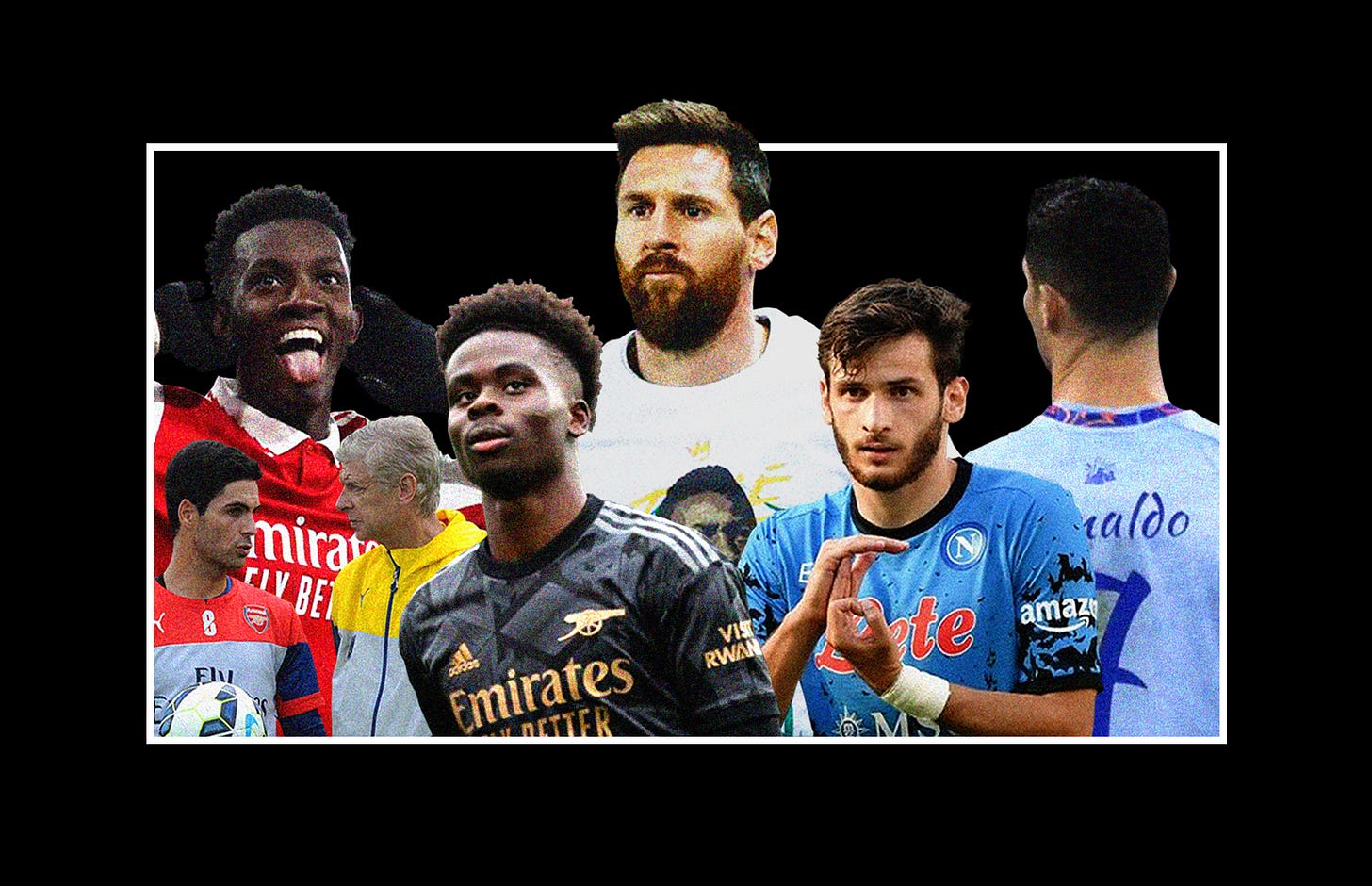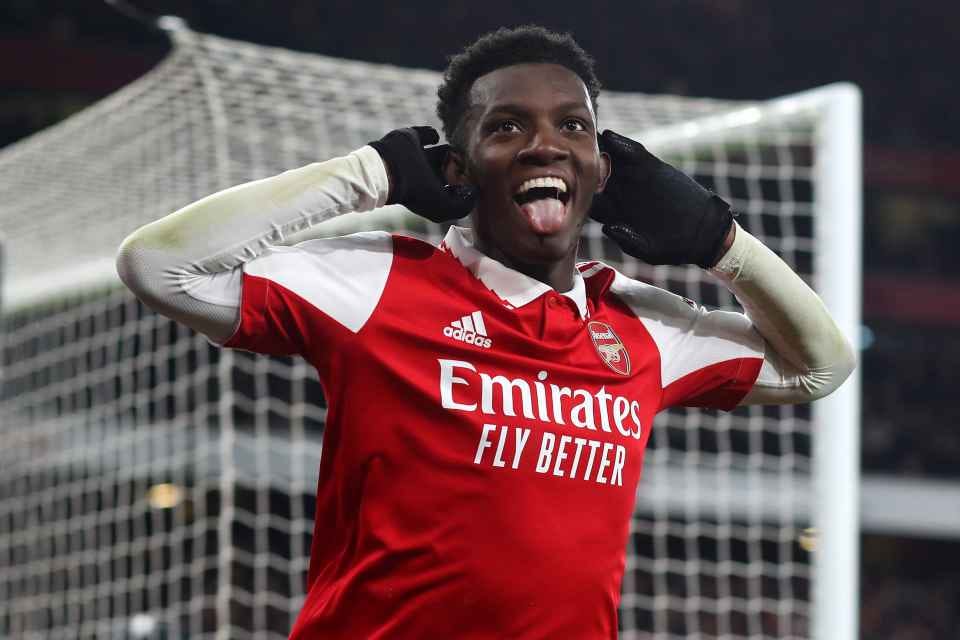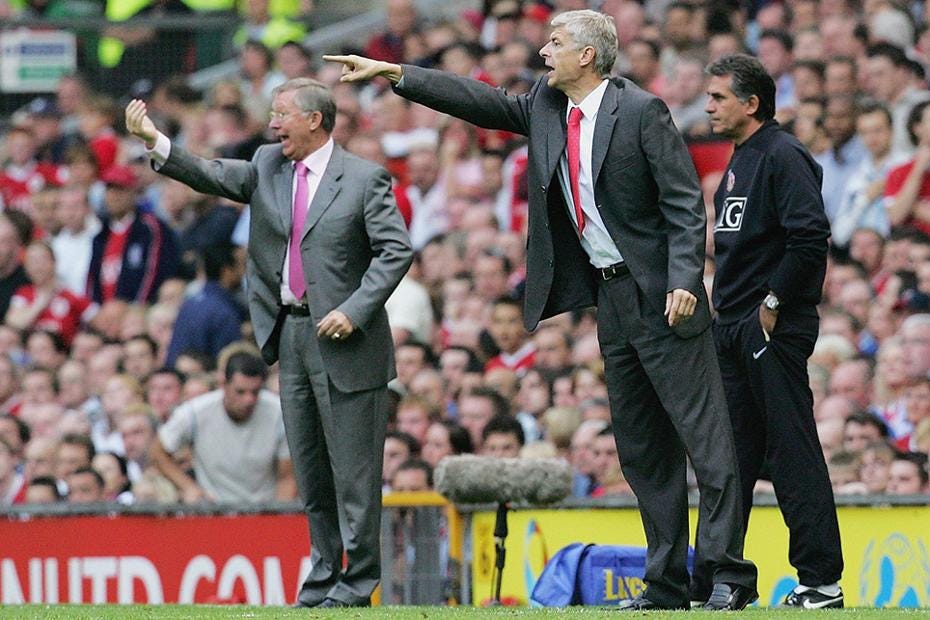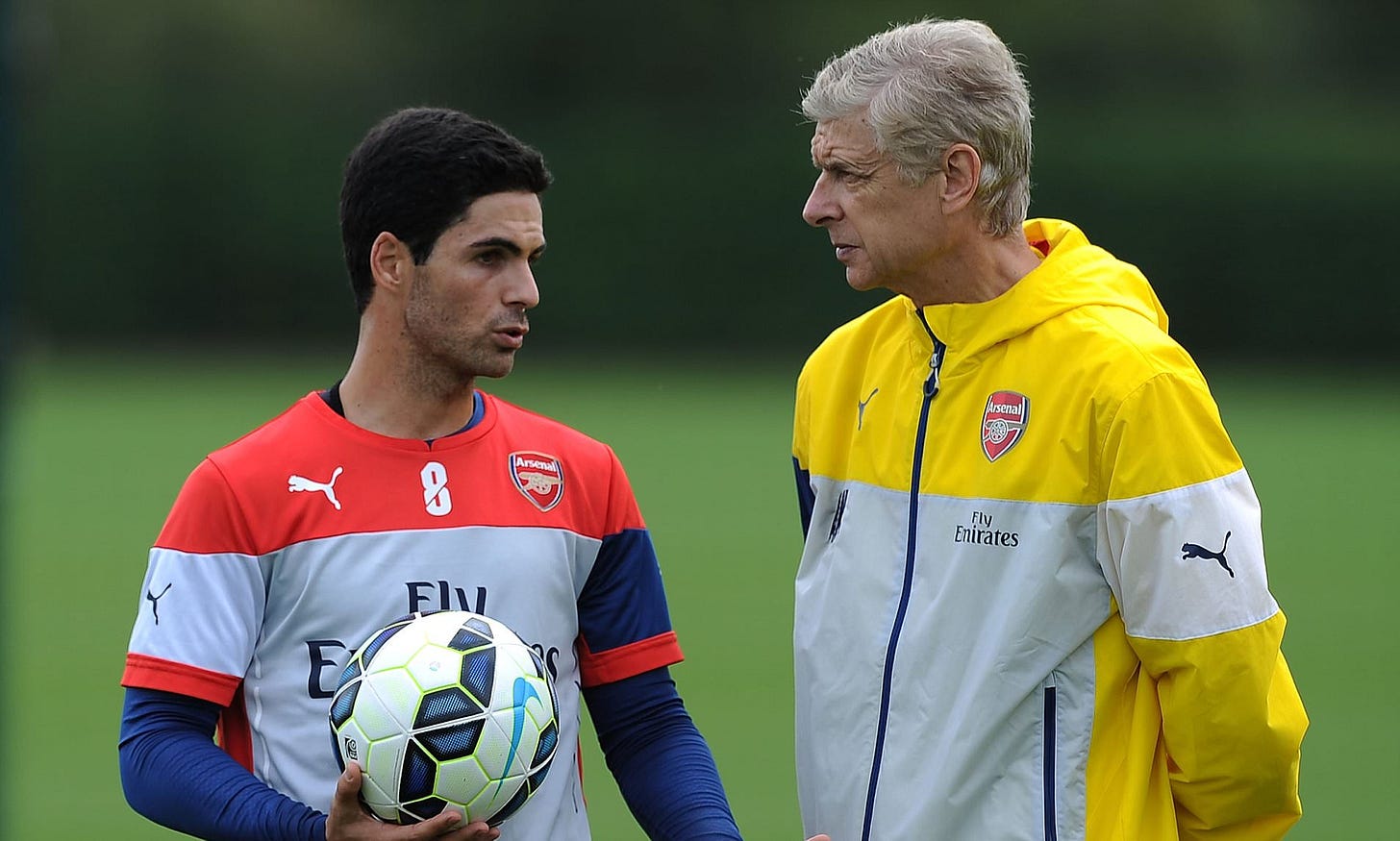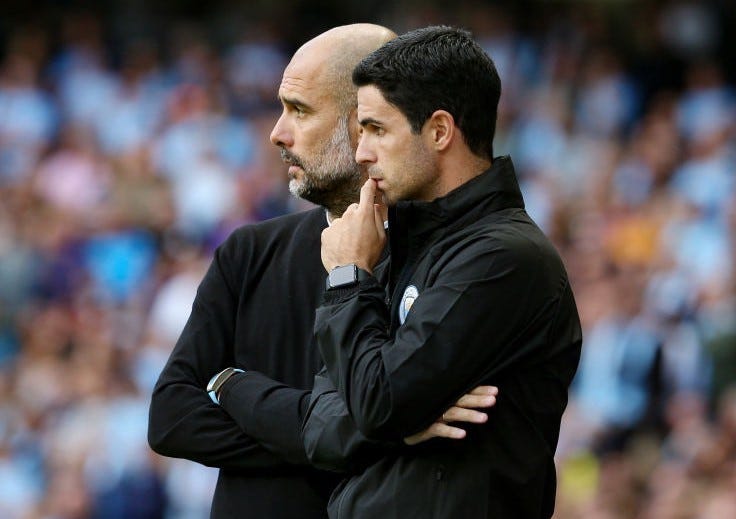Seeking Something Missing, Missing Something Left Behind
A three-act football story on goats, Arsenal, Tbilisi, and the parallels of loss that unite them
I walked outside today, and the world felt different.
Different, not in any distinguishable way. Maybe the clouds were a bit darker than usual, maybe it was a bit colder than usual, I couldn’t tell you. It wasn’t like I walked outside, and everything was purple all of a sudden. No, I mean different in the sense that something was simply… off. I can’t quite put my finger on it.
The more I try to think about what that particular thing was, the further every answer strays. I dwell on the feeling, nonetheless. I try to push it aside. Of course, that fails.
Days on end, the feeling eludes description. A feeling all too familiar, yet completely foreign. It surrounds me, engulfs my existence, yet it doesn’t make its presence known.
Perhaps it will become clearer with time.
Act I: What Happens When We Outlive Our Idols?
Last week, PSG faced off against a Saudi Pro League All-Star team, consisting of players from Al Hilal and Al Nassr, in the 2023 Riyadh Season Cup. The match ended 5-4 to PSG, but the score was the least of the storylines.
More importantly, Lionel Messi and Cristiano Ronaldo faced off against each other for the first time since 2018 – their 36th, and potentially final, time doing so.
Almost five years since their last matchup, their careers waning to an end, I think most of us would have liked this match to feel a bit different. Of course, millions tuned in to watch from across the world, but let’s face it: a glorified, WWE-style friendly is by no means a Champions League Final.
For two of the greatest footballers to ever grace a pitch, especially two who have competed side-by-side for so long, a friendly like this feels anticlimactic. It’s not the storybook ending we envisioned.

At least, not for Ronaldo – now competing in the Saudi Pro League after his contract with Manchester United was terminated. That’s no disrespect to the man, he has been competing at the pinnacle of football for almost two decades – ultimately, time was going to catch up. In Ronaldo’s case, time entered the fray as a self-perpetuated wrecking ball.
Alternatively, Messi’s departure from football has come with the highest-of-highs. After finally laying his hands on the trophy which has always alluded him, there’s not much more to achieve. Of course, he still has a Champions League campaign or two with PSG (and who knows where he will go after), but the 2022 World Cup will always be regarded as Messi’s brightest and final shining moment. Everything he does from this point forward is icing on the cake.
Nevertheless, in the wake of Argentina and Messi’s World Cup win, and only 32 days after that moment, one of the final meetings between Messi and Ronaldo somehow feels hopeless and uninspiring. It’s as if we’ve flown off the precipice of a cliff at full-speed, now in a state of slow-motion free fall.
While disappointing to many, this anticlimactic ending is quite poetic. As immortal as Messi and Ronaldo have seemed throughout their careers, at some point we need to reckon with the reality that they aren’t. We all know that eventually, Messi and Ronaldo will retire, we’ve always known that – it’s simply a fact of life. Yet, at the same time, it’s hard to grasp that feeling until it’s in the palm of your hand.
It’s the same feeling that rang around the footballing world with the passing of Pelé in late December – just 11 days after the 2022 World Cup Final. After a yearlong bout with cancer, the king of football left this earth. He’ll leave behind a monumental legacy, remembered in too many ways to count, but we’ll forever be without his presence.
Even as we saw Pelé grow old and sick, coming to terms with his mortality – as well as our own – was, and still is, hard to grapple with.
With time, as the era of Messi and Ronaldo reaches it’s conclusion, as Pelé passes, football reveals to us an all-important lesson: loss doesn’t reveal itself slowly. It comes all at once, hitting you like a freight train. Even when we anticipate it, even when we grapple with its logic, that moment still arrives all the same.
Now, here we are, staring that moment in the face, not knowing whether to shake it’s hand, give a nod, or simply walk on by. There’s no option to take a step backwards – that’s never an option.
Always forwards, never backwards, just as time flows.
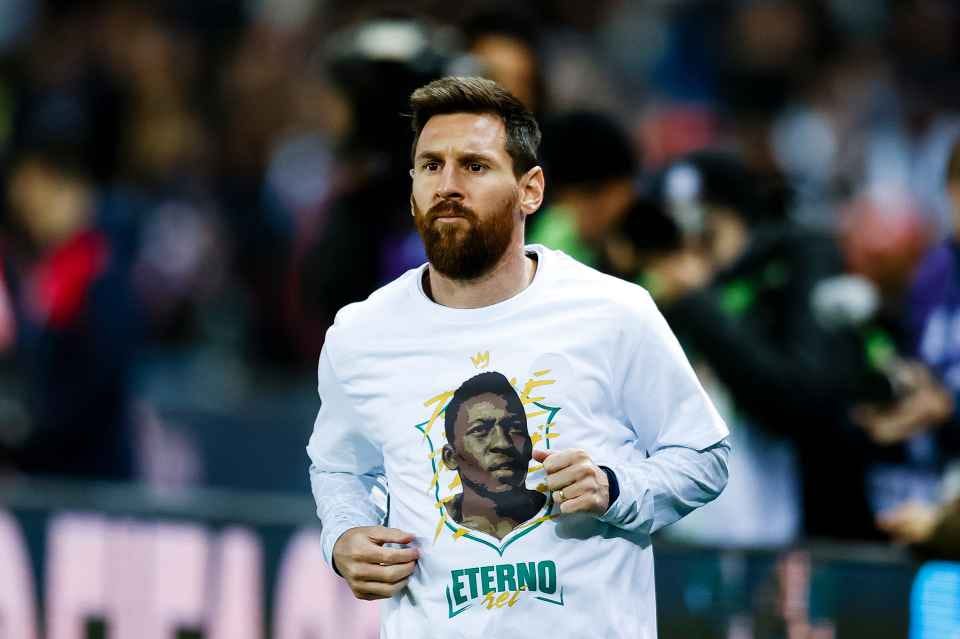
The 2023 Riyadh Season Cup, along with the events of the past few months, is a stark reminder that greatness always fades. As the footballing world comes to reckon with the decline of one era, we reckon with the death of another. What happens when we outlive our idols?
To put it bluntly, we move on. We create new idols, immortalizing those who have passed using memories, monuments, and stories – acts of remembrance to remedy the present with the past.
As much as we may try to cling to the past, the future arrives all the same. Time doesn’t stop, and neither can we. In that process is the recognition of mortality. In football, as in life, death is inevitable; memento mori – remember you must die.
What matters most is that we not dwell on that discovery, but use it to inspire.
Act II: The Mortality of Change
Several days after the 2023 Riyadh Season Cup, three to be exact, the footballing world witnessed an instant Premier League classic. Mikel Arteta’s Gunners faced off against Erik Ten Hag’s Red Devils, an all-important match in the title race, as Arsenal sat first and United sat joint-third.
Marcus Rashford, who had scored in seven of his last eight appearances, opened the scoring in the 17th minute, firing a shot past Aaron Ramsdale from about 25 yards out. Seven minutes later, Eddie Nketiah equalized with a back-post header.
The teams entered the break one-all.
In the 53rd minute, Bukayo Saka broke the deadlock, drifting inside from the right wing, cutting onto his favored left-foot, and firing a curling effort from about 25 yards out to beat David De Gea at the far post. A sensational long-distance strike to match Rashford’s from the first half. This time, the script was flipped, with Lisandro Martinez equalizing from a looping header, just six minutes after Saka’s worldie.
The score was locked at two-all.
The third deadlock of the match wore on. Arsenal probed the United penalty area, struggling to find the winner that would cement them in the pole position for the 2022/23 title. Wave after wave of attack, Arsenal couldn’t find a way through – the United defense held strong. After almost thirty minutes of a constant barrage from Arsenal, the breakthrough came.
In the 90th minute, Oleksandr Zinchenko fired a low ball across the penalty box. An on-running Martin Ødegaard got a piece of the ball, clipping it to the back post, where an alert Eddie Nketiah stabbed the ball past David De Gea with a deft, volleyed backheel flick.
The Emirates erupted.
A 3-2 classic, it felt like a match plucked from the late 1990’s or early 2000’s. An exhilarating return to the status quo, a decade after either side last won the Premier League. For supporters of both clubs, it’s a feeling that has been a long time coming.
If you ask an Arsenal or United supporter whether they thought that type of match was possible a year ago, most would say “no.” Exactly a year ago, Arsenal sat fifth in the league and United sat seventh. Both eventually missed out on Top 4 – an utter failure by the standards of two footballing empires.
A year on, normality has nearly been restored; but it didn’t come easy. For Arsenal and United, the journey back to the top has been tumultuous, to say the least.
For both, the process started with the loss of an all-time manager. In 2013, United manager Sir Alex Ferguson retired after 26 seasons, and in 2018, Arsenal manager Arsène Wenger resigned after 22 seasons. In their wake, both clubs faced a rebuilding period – bringing with it unprecedented failure.
In the Premier League era (since the inaugural 1992/93 season), no United team under Sir Alex Ferguson ever finished worse than third. Ferguson won 13 Premier League titles, finishing runners-up five times, and third-best three times – no wonder he’s considered the best manager of all time by most.
In the nine seasons since Ferguson’s departure, United have only finished Top 4 on four occasions, and they haven’t won the league.
At Arsenal, Arsène Wenger had notably less success, but crafted a powerhouse nonetheless. Wenger won three Premier League titles (including the only undefeated season in Premier League history) and finished Top 4 every season between the 1996/97 and the 2015/16 season.
In the four seasons since Wenger’s departure, Arsenal haven’t finished Top 4 once.
With the departure of Ferguson and Wenger, an era of Premier League football died. In its place, with no room for Arsenal or United, came an era defined by the dominance of Pep Guardiola and Jürgen Klopp. Years on, as City and Liverpool cope with the difficulty of maintaining greatness, a new era is ushered in.
After years of “suffering” for Arsenal and United, riddled by the sour emotions of nostalgia, the sky is finally clearing. The two clubs are, of course, at notably different stages in the process, but their return to the top shares the same sentiment: in order to live, you must first die.
While much can be said about the work Ten Hag has done in less than a year, the resurgence of Arsenal embodies the idea of rebirth.
Between 2016 and 2018, Arsenal faced the feeling of loss I discussed earlier. After 20 seasons of success, the club finished fifth and sixth in successive years, missing out on the Top 4 for the first time since the mid-1990’s. At 68-years-old, it was time for Wenger to step down:
“After careful consideration and following discussions with the club, I feel it is the right time for me to step down at the end of the season… I urge our fans to stand behind the team to finish on a high. To all the Arsenal lovers take care of the values of the club. My love and support for ever.”
Though the decision must have been excruciating, Wenger recognized the matter at hand: the life he had led at Arsenal for over two decades had reached its natural end. As eternal or invincible as it may have seemed, time was always going to catch up.
Wenger resigned and Arsenal appointed Unai Emery as his replacement – a transition manager. Despite Emery’s success at Sevilla and PSG, the situation at Arsenal was near unsalvageable. In his first season, Arsenal and Emery finished fifth, after a late-season collapse. Fifth is a fine result objectively, for a club in transition with a new manager herding a largely dysfunctional squad.
For Arsenal, fifth is failure.
Entering the 2019/20 season, Emery was on thin ice. After a 4-3-6 start in the Premier League, claiming 18 of a possible 39 points, Emery was sacked.
Almost a month later, Arsenal made the hiring that would truly revitalize the club. On December 22, 2019, Arsenal appointed a new manager: former club captain, and assistant to Pep Guardiola at Manchester City, Mikel Arteta.
Just over three years on, Arteta’s time at Arsenal can be characterized by two words: patience and youth.
In that first season, Arteta couldn’t do much to salvage the wrecked ship left behind after Emery was sacked. Arsenal finished on 56 points, in eighth – their lowest finish since the 1994/95 season.
The next season, one marred by the onset of a worldwide pandemic, Arsenal finished on 61 points. Once again, in eighth. If Arsenal supporters thought finishing fifth and sixth under Wenger was failure, what was this?
#ArtetaOut became the popular narrative amongst supporters, the vast majority calling for him to be sacked. “The job is too big for him,” was the argument of many, not-so-subtly hinting at the manager’s age and lack of experience.
Nowadays, if most big clubs finish eighth, they wouldn’t think twice about sacking the manager. With the esteem, funds, and history of Arsenal FC, how could eighth be a sign of progress?
Yet, with Arteta, they persisted.
Two years on, that heavily criticized patience is more than paying off. The youthfulness and inexperience Arteta was once mocked for has become the team’s biggest strength.
As Arsenal died with the departure of Wenger, they were reborn with the arrival of Arteta. It wasn’t a death that happened in one moment; no, it was long and painful. However in that process, through the mortality of change, something beautiful has been born.
After the win against United, at the halfway mark of the season, Arsenal sit atop the Premier League with 50 points – on pace for what would be a record-tying 100-point season.
If they do go on to win, 40-year-old Mikel Arteta would become the youngest manager to ever win the Premier League; the squad, overall, would be the youngest to ever win the Premier League; and 24-year-old Martin Ødegaard would become the second youngest captain to ever win the Premier League (missing out on John Terry’s record from the 2004/05 season by just two days).
With an attacking core of 24-year-old Ødegaard, 21-year-old Martinelli, and 21-year-old Saka – one that is well set up for long-term success – this Arsenal team are the embodiment of using loss to inspire change.
Through death and turmoil, Arsenal have endured. For football, their success is a sign that you cannot cling to the past.
Always forwards, never backwards, just as time flows.
Persistence personified, the inspired journey of this Arsenal team reminds me of a quote from one of their very own: Eddie Nketiah.
Documented in the Amazon “All or Nothing” series, there’s a clip of a conversation between Nketiah and midfielder Albert Sambi Lokonga, as they eat breakfast with Emile Smith-Rowe and Nuno Tavares. At the time, early on in the 2021/22 season, Lokonga had just joined Arsenal. The club had signed him from Belgian side Anderlecht for just under 20 million pounds the summer prior.
In the clip, Nketiah jabs at Lokonga for his attitude since joining: “You’ve changed quick, huh? This guy before was smiling, smiling.”
Smith-Rowe adds in: “Yeah, he was so happy.”
Lokonga responds, with a shrug of the shoulders: “I was playing.”
Nketiah responds: “So what, my friend? You think you’re the f–king only one not playing, my friend, huh? Stop feeling sorry for yourself and f–king wake up, yeah?”
Cutting words of wisdom from, at the time, a 22-year-old who wasn’t seeing the field himself.
Fast forward over a year and Nketiah, as well as Arsenal, is reaping the benefits of that mentality. The 23-year-old, who assumed the famed #14 shirt in the summer, is leading the line for Arsenal with the absence of Gabriel Jesus.
With his match-winner against United, bringing back nostalgic memories of a different #14 for many Arsenal supporters, Eddie Nketiah showed just what this Arsenal team is about. When you face loss head-on, when you welcome change with open arms, when you face the future with unrelenting persistence, sometimes you only need be in the right place at the right time for everything to click.
Act III: From the Ashes of a Dying Generation
1,000 miles away from the Emirates Stadium, a parallel story is unfolding.
While Arsenal are dominating the Premier League, Napoli are dominating Serie A in astoundingly similar fashion. Both clubs sit on 50 points at the halfway mark of their season, with the exact same league record of 16-1-2. Just as Arsenal would become the second-ever Premier League side to become “Centurions,” Napoli would become the second-ever Serie A side to do the same. Both managers most often set up in a 4-2-3-1 or 4-3-3 system, shifting to more of a 3-back formation in possession, and play a style of football that simply oozes class. Yet, the similarities don’t end there.
At the heart of both teams are two 21-year-old starboys who have taken the footballing world by storm: Bukayo Saka and Khvicha Kvaratskhelia. Two electric wingers who both sit on 7 goals and 7 assists in the league this season, all while Saka wears the number 7 and Kvaratskhelia wears the number 77.
Along with the numerical similarities between the two, they embody what it means to be a rising footballer in 2023 – if “rising” is even an appropriate term anymore.
Saka, London-born to Nigerian parents, the 21-year-old is already the face of Arsenal and, debatably, England’s national team. For a young Black man to be the star of each, in a nation riddled with issues of discrimination and racism, is a hallmark moment in the progression of football culture.
Yet, compared to how well the footballing world knows Bukayo Saka at this point – and if you don’t, I implore you to start with Musa Okwonga’s “The ceaseless joy of Bukayo Saka” – his starboy in parallel remains a relatively unknown figure.
Khvicha Kvaratskhelia was born in Tbilisi – the capital of the small, transcontinental country of Georgia – to a family of footballers. Both his father – Badri Kvaratskhelia – and his grandfather – Mamiya Kvaratskhelia – played professionally in Georgia, with his father also playing for a stint in Azerbaijan.
Khvicha grew up constantly playing the sport with family and friends. “Football was the most important thing in my life, as it is now,” he remarks in a 2022 interview on Napoli’s Youtube channel. The youngster grew up idolizing Real Madrid, particularly Guti and Ronaldo. In a 2022 interview with Football Italia, Khvicha remarks:
“Cristiano Ronaldo is my idol, even if my first one was Real Madrid’s Guti. When I played in the streets of Tbilisi with my friends, I wore a white shirt, writing his name on the back.”
Professionally, Khvicha played for a number of Georgian clubs in his youth, joining the academy of Georgian powerhouse Dinamo Tbilisi in 2013. In 2017, at the age of 17, Khvicha made his first team debut. In 2018, he was moved to Georgian club Rustavi, and then in 2019, he earned a big move to the Russian Premier League team Lokomotiv Moscow. After only starting one match for Lokomotiv all season, Khvicha got a move to the mid-table Russian team Rubin Kazan.
It was here that Khvicha started to shine, putting up 9 goals and 10 assists in three seasons. However, as the young Georgian began to come into his own, he was disrupted by a much larger force. In the spring of 2022, weeks after Russia invaded Ukraine, Khvicha realized he needed a way out. While Khvicha couldn’t directly move to a large European club, as he was stuck between the winter and summer transfer windows, it was his home country of Georgia that saved him.
On March 31, 2022, just over a month after the invasion of Ukraine, with Khvicha begging to flee, Rubin Kazan voided his contract and sold him for 8 million euros to Georgian club Dinamo Batumi. Three months later, on July 1, Napoli signed him from Dinamo Batumi for 10 million euros.
So began the transformation from “Kvaratskhelia” to “Kvaradona.”
Half a year later, following Napoli’s dominance in the Champions League (winning five of six Group Stage matches) and Serie A, the Georgian now has a massive cult following on social media. Hypnotized by the left-winger’s style of play – aggressive, energetic, and unforgivingly skillful – fans across the world watch on in awe, gifting him a nickname inspired by one of the all-time greats: Kvaradona.
Whenever we think that we’ve seen it all in football, something unfathomably brilliant appears. When it does, there’s no mistaking it. Such is the nature of Kvaradona’s rise.
As Ivan Nechepurenko and Rory Smith’s brilliant New York Times article “The Instant Legend of Kvaradona” puts it: “The sense of rarity is the root of Kvaratskhelia’s appeal.”
From the streets of Tbilisi to the brightest stages in Europe, the rise of Kvaradona is a tale for the ages. Most poignant, in my opinion, is the connection of the Georgian’s rise to the contemporary state of world football. A journey from humble beginnings, turned on its head by political conflict, uplifted by the reach of social media, Kvaradona is forever immortalized.
Years after impersonating Ronaldo in the streets of Tbilisi, Kvaradona is in some way filling the void that the legend’s departure from European football leaves behind – rising like a pheonix from the ashes of a dying generation.
Always forwards, never backwards, just as time flows.
In this journey, in his meteoric rise to fame, Khvicha never forgets where he comes from. His main celebration (one of many, which also include an ode to his favorite basketball player Steph Curry) is a two-handed gesture forming the letter “K” in the Georgian alphabet – the initial of his girlfriend, who remains in Georgia for her studies. A touching tribute that reminds us we’re never too big to forget where we come from.
I wonder how Khvicha feels when he thinks about Tbilisi.
Is he filled with pride for fulfilling the dreams he had as a kid? Is he filled with sadness for the distance between him and his family? Is he filled with nostalgia for the life he once lived?
Probably all those feelings, and more.
When I think about Khvicha Kvaratskhelia, when I think about Bukayo Saka, Eddie Nketiah, and Arsenal, when I think about Messi, Ronaldo, and Pelé, and I consider what it all means, I’m reminded of a scene from Wes Anderson’s The French Dispatch.
At the end of the third story in Anderson’s three-part masterpiece, food journalist Roebuck Wright (played by Jeffrey Wright) sits down beside the world renowned chef, lieutenant Nescaffier (played by Steve Park).
Nescaffier lays on an operating table, after just escaping death. When a group of bandits kidnapped the young Gigi – the Commissaire’s son – and threatened him with death, should the Commissaire not abide by their wishes, the brilliant Nescaffier hatched a beautiful plan. As the stalemate between the Commissaire and the bandits wore on into the night, Nescaffier was sent in to cook Gigi and the bandits a meal. Preparing one of his famous, ever so complex dishes, Nescaffier planted a trap – poisoning the radishes, which he knew young Gigi loathed and would never touch. Of course, Nescaffier was demanded to eat the food before anyone else, leading him to take the ultimate sacrifice – only to be saved from the precipice of death “thanks to the extreme fortitude, bolstered and braced season upon season by the richest, most potent plates, pans, and saucepots, of his almost superhuman stomach.”
As he lays on the operating table, Wright and Nescaffier share a touching moment about loss.
WRIGHT: “I admire your bravery, lieutenant.”
NESCAFFIER: “I’m not brave, I just wasn’t, in the mood to be a disappointment to everybody. I’m a foreigner you know.”
WRIGHT: “This city is full of us, isn’t it? I’m one myself.”
NESCAFFIER: “Seeking something missing, missing something left behind.”
WRIGHT: “Maybe, with good luck, we’ll find what eluded us in the places we once called home.”
Years later, the feeling returns to me, in memory.
On reflection, what I had felt was a suffocating feeling, but one without directionality, and not particularly painful. Yes, yes, it was as if a fugue state had descended on the earth, hovering in a dense fog – a fog of uncertainty, if I had to label it.
The fog had condensed so slowly, in such an omnipresent fashion, that few acknowledged its existence – everyone was still walking around, carrying out their everyday tasks. Some didn’t even realize the fog existed. Some realized it existed, but didn’t want to acknowledge it.
Sooner or later, the fog would clear. The clouds would part, the sun would shine, and that indescribable feeling would depart. Once again, leaving without disruption – seamlessly ebbing away, just as it had flowed in, unannounced, some time before.
In that moment, I came to recognize the fog as death itself. That feeling, that once indistinguishable feeling, was the confrontation of death.
Remember, you must die. It won’t come easy, and not all at once either. No, death creeps up on us; and once it arrives – poof – it’s gone just as quick.
Thanks for reading! If you enjoyed this piece, considering sharing it with the button above. If you’d like to hear more from me, you can find me on Twitter @4lex_mcfc




